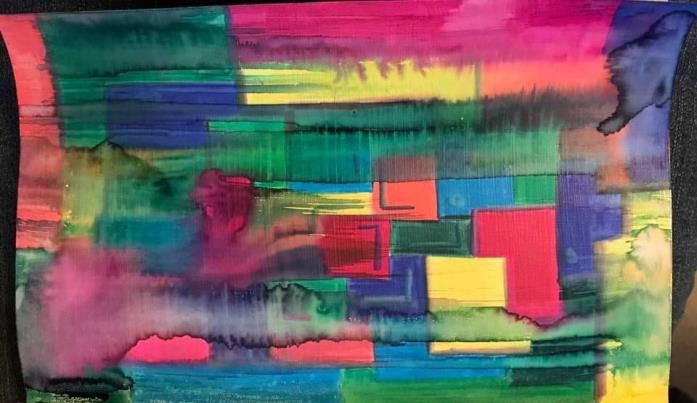
The above image is a group photo of a CiiAT online class in session on Zoom. Students and faculty from six different countries are represented here! Pictured here from the top left moving horizontally is Madison from Portland, USA, Cheryl-Anne from Victoria, Canada, Lucille from Victoria, Pia from Bangkok, Thailand, Zoe from Baffin Island, Nunavut, Pin Ju from Taipei, Taiwan, Nancy from Ottawa, Ontario, Manal from Cairo, Egypt and Rachel from Tokyo, Japan.
As a truly global institute, the Canadian International Institute of Art Therapy (CiiAT) explores cultural fluency as a group when we come together through our computers, and on our campuses in Bangkok, Thailand; Victoria, Canada and Tokyo, Japan to learn about art therapy and expressive arts therapy.
Vera Heller, PhD is one of our engaging faculty members, who taught Art Therapy and Mental Illness in Thailand last November. Heller holds a degree in Expressive Arts Therapy and gives the following delighted account of her teaching experience:
Teaching Art Therapy in Bangkok, what a beautiful adventure! As an instructor, I have been challenged in finding new ways of teaching by being in a different culture. I found out a lot about mental health in Thailand and about people’s needs. I also had the opportunity to witness the love Thai people had for their King. I was moved when I found out more about him, and his deeds, personality and talents. Above all, I feel that I had a deep human experience. I was impressed with the Thai people’s warmth, and welcoming attitude. I felt privileged to get to know Jo (the translator I worked with) and her family. I enjoyed their company, along with the students; who were open, reflexive and eager to learn and share their thoughts and feelings. I also enjoyed meeting other art therapists during a conference aimed towards creating an art therapy association. I felt part of the larger family of Art Therapists in the world. As for Bangkok, it is an incredible city in which modernity and skyscrapers meet golden towers and enchanting palaces. Everything was amazing, new and enriching. I would love to go back! – Vera Heller
To deepen our focus on providing our students with a dynamic cultural perspective of Art Therapy, CiiAT provides online courses. We use the online platform, Zoom, which acts as a video conference call-like digital and global classroom; allowing our teachers and students to conduct class and interact with each other live-online, and in real-time. Having a platform that allows the discussion of respect and nonjudgement between people of varying cultures is paramount in the field of Art Therapy and expressive arts therapies. These topics are discussed with great emphasis in our cultural digital classrooms. The students are encouraged to create their own guidelines of what makes them feel safe in a virtual classroom, and are given the opportunity to talk about this from their unique cultural background and experience.
The classes meet once a week, coming face-to-face in a synchronous way, building bridges, despite the physical distance. We create a safe virtual space together by being able to see and interact with each other via Zoom. Great care and attention is given by both the students, and our faculty, in creating a safe and confidential space physically with their computers. This provides the students with a unique learning opportunity.
Early on in their education, the students must negotiate a safe environment for themselves, and their classmates, whether their family and pets are at home with them during class time or not. The vital skill of being able to facilitate a safe physical, and digital space in class gives our students an advantage in our ever-advancing global technological society. Virtual therapy sessions are convenient, and sometimes the only, choice for many clients who are unable to access Art Therapy in their home communities. Online classes enable our students to familiarize themselves with a working model of Art Therapy in a digital and confidential space.
The virtual classroom can translate to the virtual office space once our students have graduated, and are working in the field. They will have acquired the necessary foundations of digital ethics and experience to facilitate Art Therapy sessions with clients in both physical, and virtual meeting places. Furthermore, the ease of the digital classroom allows students to remain at home, regardless of where they live in the world, and continue working in their community to be fiscally able to study. This also broadens the scope of Art Therapy services available to people in the student’s home community, once they are working in the field. As I have taken online classes at CiiAT myself, I can attest to the triumph of coming together to learn and make art both individually, and as a group in class digitally.
I am currently enrolled in the online live Group Art Therapy class, taught by Michelle Winkel, MFT, REAT. Group activities allow us to feel closer to one another, despite the physical distance.
It’s truly an exciting time to be living in when we are able to come together, no matter where we are in the world, and build bridges of understanding and healing together through the Arts!
Students working together in TokyoWatercolor 2017, Cheryl-Anne Webster

